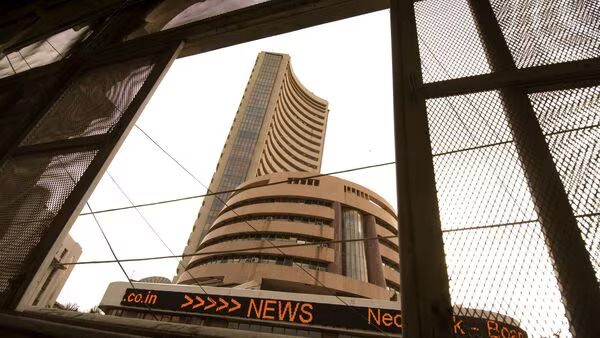The Indian stock market continued its downward trend for the sixth consecutive day as both the Sensex and Nifty 50 indices ended in the red, plagued by intense selling pressure. A bear market trend dominated Dalal Street, with investor sentiment dented by global and domestic concerns, sparking significant losses across sectors. The FMCG (Fast-Moving Consumer Goods) segment faced the brunt of this bearish spell, with stocks in the sector suffering the deepest cuts as investors offloaded shares.
The Sensex closed around 200 points lower, taking the benchmark index well below recent highs. Meanwhile, the Nifty 50 slipped below the key psychological mark, recording a near 0.5% drop for the day. This extended the downward trend of both indices, raising concerns about the market’s near-term outlook. Experts attribute the prolonged slump to a mix of global economic uncertainties, including inflation concerns, rising interest rates in global markets, and domestic headwinds, particularly in the FMCG sector. Investors appear increasingly cautious as they await clarity on various macroeconomic factors before making further commitments in the market.
One of the most notable aspects of the day’s trading was the steep decline in FMCG stocks, which have been under sustained pressure in recent weeks. Major players in the FMCG segment, including companies like Hindustan Unilever, ITC, and Nestle India, saw their stock values erode significantly. Market analysts attribute this to several factors, including rising input costs, slower-than-expected rural demand recovery, and concerns over profit margins amid inflationary pressures. The FMCG sector, typically considered a defensive play during economic downturns, faced an unusual level of selling, indicating broader market pessimism even in traditionally stable sectors.
The banking and financial sectors also witnessed losses, albeit to a lesser degree than FMCG. Stocks from major banks such as HDFC Bank, ICICI Bank, and State Bank of India slid moderately as fears of slowing credit growth and rising interest rates continue to weigh on the financial sector. In particular, concerns over non-performing assets (NPAs) and tighter lending standards are impacting investor confidence in banking stocks. Additionally, global factors like the recent U.S. Federal Reserve policy stance, which hints at further rate hikes, have further pressured financial stocks as the impact of higher interest rates may dampen borrowing demand and corporate earnings.
Global market cues further compounded the cautious sentiment on Dalal Street. Asian and European markets were also largely in the red, reacting to weaker-than-expected economic data from China and concerns over tightening monetary policies in the U.S. and Europe. The global impact of inflationary pressures is prompting central banks around the world to adopt tighter monetary stances, sparking fears of a potential economic slowdown. This has led to cautious sentiment across global markets, and the Indian market is no exception. The fear of an impending slowdown or even recession in some economies has made investors increasingly risk-averse, preferring to book profits and seek safer asset classes.
Amid this downward trend, only a few sectors managed to end on a positive note, with IT and pharmaceutical stocks seeing limited gains. IT stocks like Infosys and TCS, for instance, managed to hold their ground as the sector benefits from a weaker rupee and steady demand from global clients. Pharma companies also saw some buying interest due to their defensive nature, attracting investors looking to hedge against the volatility in other sectors. However, these gains were minimal and did not significantly offset the losses incurred across the broader market.
Looking forward, market experts believe the near-term outlook remains cautious, with the potential for further correction if global economic uncertainties continue to escalate. The upcoming earnings season will also be crucial, as investors look for positive surprises that could provide some relief to the current pessimistic trend. Analysts recommend a selective approach, advising investors to consider sectors with stable earnings growth and minimal exposure to global headwinds, such as IT and pharmaceuticals.
In summary, the prolonged bearish spell on Dalal Street has raised concerns about a potential short-term correction as investors remain wary of the economic landscape. With FMCG stocks taking a particularly severe hit and global market cues showing limited optimism, the Sensex and Nifty 50 may continue to face pressure in the coming sessions. Investors are advised to remain cautious and adopt a conservative approach as they navigate the current volatility.









